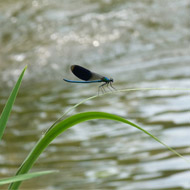
Eighty-eight per cent of samples contaminated with harmful pesticides
British rivers are heavily contaminated with neonicotinoids, the first analysis of new monitoring data has revealed.
Under the EU Water Framework Directive ‘Watch List’ initiative, the UK was required to introduce a pilot monitoring scheme for all five commonly used neonicotinoids - Imidacloprid, Clothianidin, Thiamethoxam, Acetamiprid and Thiacloprid.
Of the 23 sites sampled in 2016, 88 per cent were found to be contaminated with neonicotinoids, eight rivers in England exceeded recommended chronic pollution limits, and two were acutely polluted.
The worst polluted river was The River Waveney on the Norfolk/Suffolk border, according to the data. The River Wensum in Norfolk was also heavily polluted as well as The River Tame in the West Midlands.
“We are devastated to discover that many British Rivers have been heavily damaged by neonicotinoid insecticides. It is vital that action is taken to completely ban these three toxins, including in greenhouses and on pets, before another year of disgraceful pollution occurs,” said Buglife CEO, Matt Shardlow.
Angling Trust CEO Mark Lloyd called on the government to ‘act urgently’ to ban continued use of neonicotinoids to protect wildlife, fisheries and drinking water.
“Three years ago, the Angling Trust pressed the Environment Agency to sample neonicotinoids in rivers after academic papers showed that they can have a significant impact on insects, the main food for most fish,” he said. “These results are highly alarming in the context of widespread declines in aquatic insect life and fish populations."
Whilst there is much research to suggest that neonicotinoids are harmful to bees, little attention has been given to the effect of the pestcides on aquatic insects.
Specific concerns were raised about the levels of imidacloprid in rivers including urban rivers and a remote Scottish stream in the Cairngorns. Imidacloprid is now a rare arable insecticide, but its high persistence in soil means that it will continue polluting water in arable areas for years to come.
It is still used in greenhouses, and as a flea treatment on pets. According to Buglife, the most likely source of pollution in the Cairngorns is a treated dog entering the stream.



 The RCVS has announced a new version of its 1CPD mobile app, with enhanced features for veterinary surgeons and veterinary nurses to record their continuing professional development.
The RCVS has announced a new version of its 1CPD mobile app, with enhanced features for veterinary surgeons and veterinary nurses to record their continuing professional development.